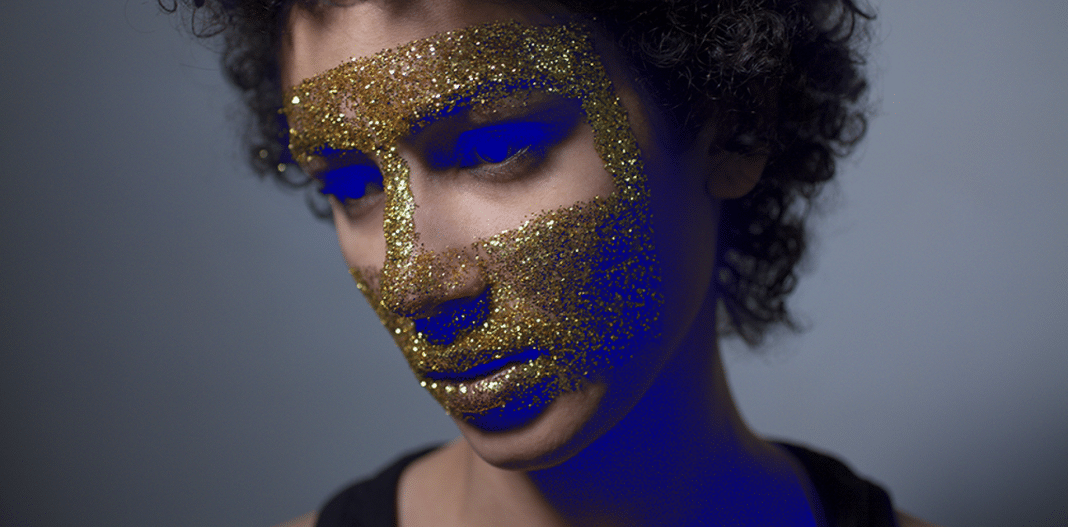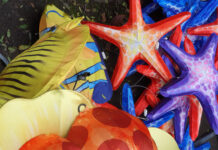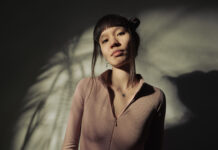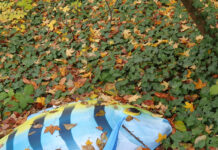Photo: Olivier Jean Rose & Julia Castel (Deena Abdelwahed)
Yes, Deena Abdelwahed will open Berghain’s already infamous Säule floor near the end of March and no, that’s not why we’ve asked her to contribute a mix to our Groove podcast. In fact, the Tunisian-born artist has caught our attention with a slew of projects like All Hail Mother Internet and sat down with Laura Aha to talk about club culture in Tunisia for our 161st issue. Shortly before the release of her debut EP Klabb for the French imprint Infiné, Deena Abdelwahed delivers a mix that is a just as much of a bass-heavy affair as her own music.
You have originally been working as a Funk and Jazz singer before joining Zied Meddeb Hamrouni’s World Full Of Bass collective in 2011. How did you get in touch with electronic music and what where records or artists that drew you into electronic music?
The Bangs Works Vol. 1 compilation by Planet Mu has been one of my key influences. I have been regularly playing the tracks in my first DJ sets. But I also learnt to develop my dancing skills and to please the crowd with M.I.A, Fatima al-Qadiri, Clap! Clap!, Débruit mashed up with global bass sounds like Baile Funk, Kuduro or Trap music.
Your radio drama All Hail Mother Internet, you portray a culture characterised by generational conflicts. How would you describe the situation of Tunisia’s youth of today – which obstacles do they have to face?
The youth have a lot of respect for the older generations. You will see grandchildren bowing down to their grandparents. But on the other hand, and from what I have experienced myself, young people never get respected by the oder generations before they become adults. Their fragility is exploited. They obey because they get the impression, that they will only understand the world if the follow their elder`s orders. Assuming that they succeeded in surviving harder times. In reality, they face illusions and disillusions, false promises directly bound to the older generation’s responsibilities: like the IMF debt or the absence of freedom to travel without a visa.
Klabb, your formal debut on the French label InFiné, fuses more traditional styles with contemporary club music. Why is it important to you to incorporate the sounds and voices of your home country?
It is actually more personal than geographical. It´s about me, Deena, not especially about being proud of coming from where I lived. I neither grew up with a rich musical environment nor in a very artistic family. I learned to listen to music in radios or to any music that was played in malls, cafés, or weddings… There was simply no alternative. So I tried to remix in my head what I was offered to listen to until I got a personal computer with a fast internet connection.
You have been part of the fictional group Joujma and contributed music to the movie على حلّة عيني (As I Open My Eyes), in which you have accordingly starred. What is it that draws you to collaborative work as with Joujma or also World Full Of Bass?
Joujma reminded me the time when I was 19 and was rehearsing in a Jazz Funk band. Almost the same as in the movie, I was singing with Jazz instrumentalists during the Ben Ali era. I was not as courageous as “Farah” by then. Singing about politics was really a very dangerous move. World Full Of Bass was a totally different thing. Free parties, alcohol, Dub and electronic dance music other than conventional House and Techno. The soundtrack of the clubs that we could not afford.
على حلّة عيني follows Farah (Baya Medhaffer), who exchanges her life as a soon-to-be-doctor with that of a singer in a political Rock band. In your interview with Laura Aha for Groove last year, you yourself stated that you don’t consider your own music to be political rather than social. What exactly does that mean – and what would the social utopia you’ve outlined in the same interview look like?
Joujma and Farah were dealing with a dysfunctional political system, the government, and especially with its police. I would like to criticize the relationships between living people, families and society’s culture. What comes first? We ask ourselves: political policies or social morality? My response to myself is that we deal with what we know best. Since I have been through and witnessed many injustices, I qualify myself social more than political since I tend to make music that involved social issues more than political issues.
Much like the Klabb EP, your mix for our Groove podcast is a bass-heavy affair. What was your idea behind it?
I love Bass! In Groove’s case, this is a collection of tracks which shapes for me a kind of fresh universal and humanistic consciousness . There is some kind of spiritual common emerging from France, Greece, Germany, Ghana, Russia, USA, Israel, Australia and Tunisia.
Last but not least: Where can we see you perform in the forthcoming months and what are your plans for the rest of the year?
The most notable for my friends and me is my DJ set on the 23rd of March in Berghain, Berlin; 10th of March in Paris for a local event producers Nova mix. 31st of March in Brussels to perform All Hail Mother Internet. More will be announced soon. I would like to re-edit some old demos for this summer, to prepare a proper live show and to collaborate more with my VJ friend WAF on visuals as well as other electronic music artists.
Stream: Deena Abdelwahed – Groove Podcast 95
01. Basile – Distance
02. BIRDSONG – Nire feat. Bunny Michael (Ziúr Remix)
03. Northern Draw – Raspy Draw
04. Deena Abdelwahed – Klabb V2
05. Deena Abdelwahed – Chouf
06. Tropikal Camel – Habibi Acid
07. Black Merlin – Proto World
08. Insha – Quiet Storm
09. Deena Abdelwahed – Jalel Eddin Rrumi
10. Consulate – Nieuw Maas Terreur
11. Jowaa – Bakazobaa
12. Fraxinus – Stone Drums
13. Dva Damas – Wet Vision
14. Abyss X – Mouthed

![[REWIND 2024]: Altersdiskriminierung und Generationsaustausch im Nachtleben: Ein paar Jahre auf Albernheit und Abriss Zu alt zum feiern? (Illustration: DALL-E)](https://groove.de/wp-content/uploads/2024/12/roundtable-idee-grafik-5-218x150.webp)
![[REWIND 2024]: Die Szene ist der Sargnagel im Berliner Clubsterben](https://groove.de/wp-content/uploads/2024/12/clubsterben-berlin-szene-2-218x150.webp)


